First, let me state my basic thesis poetically. To some, it will sound unoriginal, implausible, and overwrought:
We in the West are falling in a moral abyss. We are in mid-fall. It’s been long since we careened off the precipice, though we have not hit bottom.
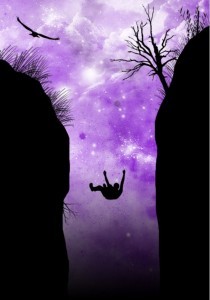
Poetic language is vague, so let me explain what I mean.
1. Plumbing the abyss
We began falling when we (many of us) stopped earnestly using the language of moral judgment, i.e., the discourse of individual responsibility, of suffering the hard consequences of foolish action, of liberal knowledge, hard-earned wisdom, of bad judgment, of the risky exercise of freedom that entails and requires judgment, of sound character and good habit, of courage, humility, and other virtues. In short, our strength of character is weakened, and the cultural wisdom needed to keep it strong, the cultural capital we built up over thousands of years, has been squandered in the space of a few generations.
So many good and necessary habits we used to have, which strengthened our character and that of our children, have been carelessly tossed in the dustbin of history. Instead, look at what we have. Look honestly. Look past your partisan or religious contempt and your haughty reactions, and try to judge soberly how far what I say here is actually true.
Blaming others, rejecting responsibility… What we have is a society that blames others for our failings. Our problems are blamed on benighted parents, racism and sexism, evil corporate masters, venal politicians, the corrupting influence of mass media, violent video games, and other dark forces. But ultimately, these too are all thought to be pawns and tools, and our problems are really all “structural” or societal. Ultimately we must engineer a better way to control the dark forces that inflict all our problems. In any case, our problems are not individual. We, too many of us, act as if we have no individual responsibility for our failings. We cannot be blamed.
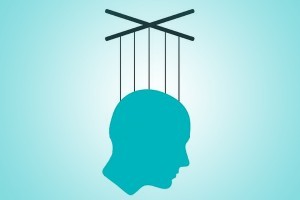
…because of a rejection of personal freedom. We have a society that increasingly rejects personal blame because it increasingly rejects personal freedom. This is a natural human belief that dies hard, but it is dying with contemporary education. Cynical journalists and “thought leaders” quote philosophically sophomoric scientists who assure us that free will is an illusion. Many educated young people believe this. Many educated older people also act as if they believe it. Our society is bathed in the language of therapy rather than philosophy and ethics. We are not lazy; we are depressed. We are not selfish, vain, and nasty; we have narcissistic personality disorder. Our children aren’t immature and irresponsible; their frontal cortexes are incompletely developed. We are not evil; we have antisocial personality disorder. Mass murderers are not inhumanly wicked, they are always “troubled” and must have a history of mental illness. The most appalling enemies of our civilization, groups like ISIS, are not monsters, they are merely reacting to abuse of Western power in their home territory. Even positive responsibility—praise—sometimes goes by the wayside. The inventors and entrepreneurs of every sort, the people who actually create progress, are sometimes denied their accomplishments by an egalitarian tendency to say, “you didn’t build that”: it was society, it was all of us working together. Both blame and praise are shared out into society at large.
Collectivized risk and coddling above freedom. We have a society that insulates our youth from risk, that cushions every blow, that places safety above freedom. Our older generations remember a society in which one saved diligently for “a rainy day.” Now, we have collectivized risk, with credit cards, bankruptcy meaning only the loss of credit, the social safety net beneath it all. These are not bad things in moderation, surely, but we have gone too far. We are forced to buckle up and we may not smoke in public—all for our own good, of course, and who really can complain? Many of our professors and university administrators are increasingly comfortable with and even insistent upon sheltering our children not just from harsh behavior but from harsh talk and offensive ideas, ideas known by society’s enlightened elite to be benighted and wrong. A growing number of young people, meanwhile, being so used to their cocoon-like existence, demand such coddling; they were apparently never taught that there might be something wrong with it, wrong because inconsistent with their self-reliance, rights, and freedoms.
“The salt of the earth”—ignored, at best. We have a society that indeed glorifies foolish youth and is fascinated with famous idiots, finding hard-earned wisdom—as opposed to the latest fads handed down from on high—to be just another, quaint point of view. The ordinary, solid man and woman, who get married, stay together, maintain a stable household for children, are productive and pay their taxes, obey the law and do their duty, and grow old and full of wisdom—these people used to be thought of as “the salt of the earth.” Today they are ignored, forgotten; worse, sneered at as bourgeois, middle class, and old-fashioned; or worse still, dismissed as merely “privileged” and as part of an oppressor class. They are rarely honored, except by their families and friends. The former “salt of the earth” hear signals everywhere that their lives are boring, inauthentic, even offensive. Many philosophers and priests of days gone by would disagree, but they too are boring and offensive.
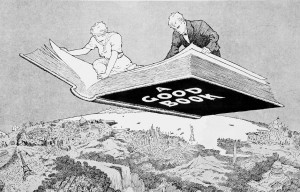
Wisdom literature—ignored, at best. We consult psychologists, celebrities, and pundits for wise advice on living, rather than philosophers and priests—but perhaps that’s understandable, since so many of today’s philosophers and priests have really gotten out of the wisdom game, after all. The philosophers focus on technical questions far more than broad, useful soul- and mind-craft, and I have heard that our religious leaders focus not on how to avoid sin and live more pure and holy lives, but instead on how to rely on God to inspire us to success and abundant joy. Increasingly, our teachers reject the wisdom of “dead white men,” glorifying whatever is new or genuinely produced by online communities, so long as it can be consumed quickly and easily by those who have never been taught to pay attention. The great books are less and less thought of as sources of perennial wisdom but instead are increasingly forgotten or, when remembered, viewed with contempt and hatred.
Increasingly, we lack the cultural capital needed to pass on the classic virtues.
So very much has been lost already.

A society of educated fools. Wisdom—gone. Although more of us than ever are college educated now, fewer than ever seem acquainted with or comfortable discoursing in terms of the best concepts, examples, and narratives of perennial, classical Western values. It’s all so old-fashioned and pretentious to us now. Much wisdom could be found in the Bible, whatever its faults might be, but in a largely secular society, those things are mentioned only the church services that a dwindling minority of the population attend on Sunday, and often not even there. Public discourse, which now mostly takes place online, the discourse that at least among educated adults ought to be the most informed by classical standards of knowledge and logic, is mostly an exchange of tiresome fallacies, insults, and memes, when it does not consist of outraged head-nodding in Internet silos. We have become a society of educated fools.
Conscience replaced. And the practical wisdom, the wisdom that ought to inform how we spend our time and guide important decisions, seems a dwindling commodity as well, as more and more supposed adults act like selfish adolescents in their personal habits and relationships. Judgment of ourselves in moral terms, once called “conscience,” is rarely done or discussed. We can’t help but feel guilty at our faults—moral feelings die hard. But we don’t put a moral description on our faults. They are mistakes, self-destructive behavior, stresses, failures, embarrassments, addictions, flare-ups of psychological problems. They are so rarely vices, bad habits, foolish choices, bad actions, shameful behavior. The very idea of practical wisdom sounds increasingly antique and even foreign. Today we have “life hacks” that sound like technology instead of soulcraft.
Out of control, with a shrug. Self-control, or temperance—gone. Since around the 1990s we have freely admitted to binging on everything. We waste thousands of hours of our free time in front of television sets, not improving ourselves. We smile indulgently as many of our college students get drunk every weekend and “hook up”—it’s merely a rite of passage and youthful high spirits. Of course, everyone can agree there’s a problem when one of these hook-ups ends in a rape accusation. But the problem, society’s leaders say, is that our young men have failed to receive the proper sensitivity training. It is not due to a thoroughly vicious tendency on the part of everyone, men and women of all ages, to dehumanize others, to use others. We don’t discuss how appallingly damaging this high-spirited behavior can be to the souls of some students, those who go on to become alcoholics (not drunkards), who get pregnant and abort the babies and regret it for the rest of their lives, who cannot view the opposite sex with a sense of romance and without cynicism. Avoiding the entire morass, many of our men are glutted on desensitizing porn. Even our boys are glutted—on time-wasting video games. Many of us are glutted on social media, a huge time-suck that is often strangely impersonal. In the face of our many and varied temptations, it seems most of us can barely hold it together. We can’t stop ourselves—or so we tell ourselves, with a self-indulgent shrug.
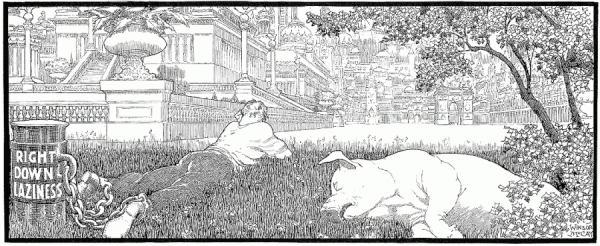
Kindness and humility, uncool. Humility, unselfishness, kindness—the winning social graces of caritas, they too are sadly mostly gone. We are still restrained by peer pressures to behave more or less politely. But there is something at once pretentious and very small about so many people today. Few seem to find a value even in the outward display of ostensible humility, such as self-deprecating remarks. Besides that, actual humility involves candidly admitting faults, limitations, and ignorance, apologizing, allowing others to go first—everything that flows from a realistic assessment of human frailties and an acknowledgement of others as true equals. Instead, we are told to promote our personal brands and “never apologize, never explain.” In big cities especially, civilization has evolved in such a way that “taking what’s yours” and aggressive self-assertion are expected parts of being an ambitious go-getter. It is also simply part of being “cool.” Indeed, the very idea of “cool” involves some amount of contempt or cynicism toward other human beings. The notion seems to be that it is cool to act like you don’t really care about basic civility and kindness, about acting like ladies and gentlemen. The sheer inhumanity of man toward man sometimes on display online and in traffic still sometimes surprises me, and I’m almost 50; younger people don’t realize that “polite society” wasn’t always like this. It’s changed—really. Things have gotten better in some ways, yes, for example toward women and minorities; but they have also become ruder, cruder, and less graceful toward everyone.
I could go on but I don’t want to write a book—I just want to make it clear what I mean when I say we are in a “moral abyss.”
2. What the abyss is not
A nonpartisan abyss. I have not mentioned the moral criticisms conservatives make of the liberals: I take no stand, here, on whether the problems I have sketched are related to the conservative political bêtes noire of abortion, gay marriage, and drug legalization. Nor do I mention the moral criticisms liberals make of conservatives. Whether lingering intolerance, racism, sexism, anti-intellectualism, etc., are part of the abyss, I will leave the reader to decide.
The abyss is throughly nonpartisan. I have many friends who would take great issue with any suggestion that any such moral abyss is a consequence of the post-1960s liberal drift of society. I think they will mostly agree that good habits, and the classical virtues I have discussed, are important. I think my conservative friends will agree as well.
The sociological abyss. While I find our moral abyss can be described in a politically neutral way, there are some deep social problems I do associate with this moral abyss. Divorce rates have stayed at 50% for the last half-century; illegitimacy rates have soared over 40%, while marriage rates have shockingly declined; in Western societies and especially among elites, childbearing has fallen below the replacement rate, and appallingly, certain radicals in the “childfree” movement readily admit that they hate children; drug addiction is widely regarded as one of the leading ills of society; homelessness remains a huge problem; crime, while it has declined, lingers above pre-1970 rates, and it has probably declined in the U.S. because of how many criminals we lock up for long periods; etc. Arguably, these are each related to the common atrophying of our character.
Call all that the sociological abyss, and as appalling as it is, it is not the abyss that I mean. As bad and as consequential as all that is, I am more concerned about the moral abyss that resides within each of us.
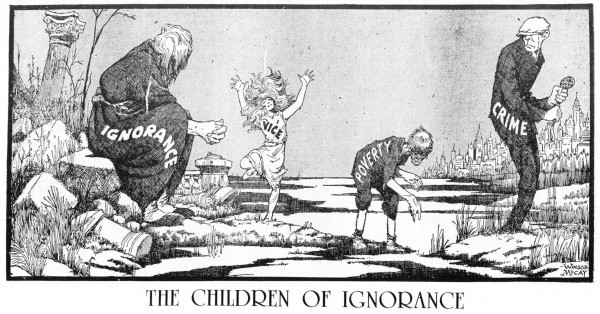
The abyss in us. I mean an abyss within me and within you. There are “saints” among us, no doubt. I’m not one of them, and I doubt you, reader, are one either. Our souls, so to speak, have collectively atrophied. When I talk about such things as lack of temperance and unkindness, I think ruefully of myself, my friends, and my family as much as I think of anyone else. I’m not trying to be falsely modest; I am making a hand-wringing confession. These problems seem to be in all of us, or nearly all of us, to some extent. If my hypothesis is correct and there were some valid way to measure at least the classical virtues I have mentioned, then as a society we would have seen a measurable decline from a hundred years ago until now.
Aren’t we living in a golden age? Still, you might say, it seems somehow ridiculous and perverse to complain about a moral abyss, and, if not motivated by a religious point of view, my complaint is simply weird, I will be told. (Especially by my fellow libertarians.) The world has gotten better. Literacy rates worldwide have grown. Standards of living have risen. Crime has declined. We live in nothing short of a golden age of invention, entrepreneurship, and technology.
A gilded age. All true. But all completely and utterly irrelevant to the problem I’m endeavoring to describe. Please, please make an effort to understand what I’m saying; it’s important. The problem I’m describing is not reliably reflected in sociological or partisan issues. Of course it seems bizarre, to someone strolling down the bustling, famous, elite avenues of New York City, San Francisco, London, or Paris, to hear we are falling in a moral abyss. I understand the attitude. I get it: our society is deeply impressive, yes, in many ways. I’d say we live in a gilded age.
If this is your reaction, I want to grab you metaphorically by the collar and shake some sense into you, because you don’t comprehend at all. The outward trappings of civilization in the centers of power mean nothing to the character of the everyday person in the civilization. Surely, if you are liberally educated or have some moral sense, you must know this.
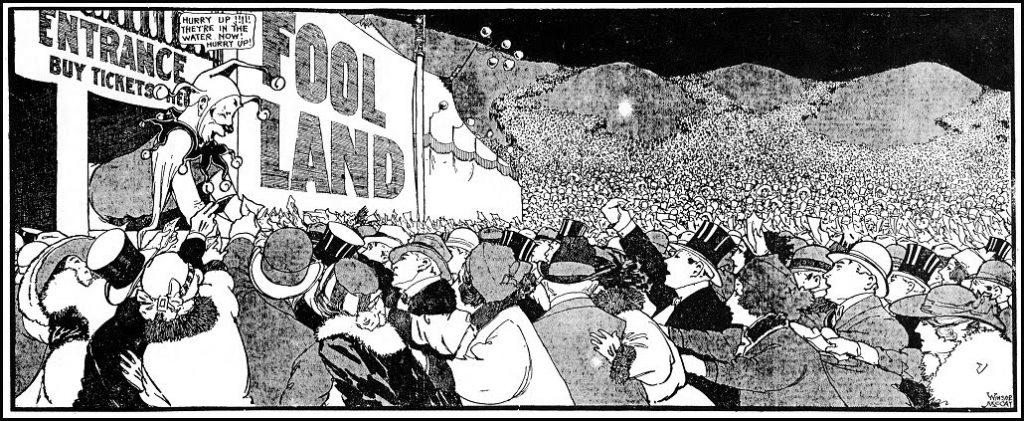
3. We need to change
The challenges of parenting in the 21st century. So many parents lack a knowledge of the religious texts, the literature, the history, and the philosophy teaching such virtues. They have a weak grasp of the concepts and of the language needed to pass them on. Above all, they lack the virtues within themselves to teach them by example. Consequently, parents today produce children that must struggle to learn the qualities of character they so desperately need to know to lead decent, contented lives and ultimately maintain our civilization. And not surprisingly, we parents fail a lot, even if we try. It was always so, I’ll be told. Perhaps, but it’s gotten worse, a lot worse. The virtues were already weakened in our own parents’ generation.
Keeping up with the equally decadent Joneses. I admit that the problems I’m describing here might seem relatively unimportant “first world problems.” Your family is not homeless, probably nobody is strung out on drugs, the children are loved by their parents (whether together or divorced), etc. You’re doing fine. In that case, then yes, OK: you’re doubtless doing just fine compared to the Joneses. But you and the Joneses and everybody else together are living in a weakened version of Western civilization. I fear we are living on borrowed time, running on the fumes of the Enlightenment. The moral fiber within each of us has weakened, and in some it has thinned to the breaking point.
What is to blame for mass murders. It breaks in various startling ways. It was, for example, the recent shooting in Roseberg, Oregon, of nine innocent people, that inspired this cri du coeur.
Here’s why I don’t blame guns for mass murders. We went through generations in which guns were much less restricted than they are now, and we did not have regular mass shootings. Blame, instead, our moral abyss. We need to begin by blaming ourselves, our bad habits, and above all our utter foolish incomprehension about the way freedom, responsibility, and morality work in the world. After these atrocities, all too often we see hear stories that a brazen killer was “a nice guy” and good citizen and seemed normal enough. To be sure, sometimes the evil among us hide their evil thoughts and habits very well. But I think more often the actual behavior of those people is just not morally judged, period.
The rejection of responsibility makes the atrocities possible. The fact that we must look to societal causes rather than within the souls of the murderers—that is of course what these people are, after all, cold-blooded, soulless killers—is a profoundly deep part of the problem that brings these monsters into existence. If they had been raised in a society in which they were taught to take responsibility for themselves, in which the tools in their hands are not blamed, but instead the characters that wield them, then they might have found within themselves the moral wherewithal to resist the temptation to take out their frustrations on innocent others.
We are the abyss. I blame the monsters first and foremost. I also blame their parents and the abysmally amoral society they were brought up in, without which they would not seek to lash out as they do. “There but for the grace of God go I,” says the lovely, humble Christian sentiment. I do blame the abyss. But we are the abyss, all of us. The abyss is in the killers, it is in their parents, and it is in me, and you, and almost everyone in this utterly degenerate old world.
We need to change.
If we find a purpose in the so many senseless killings of innocents, let it be a call to all of us, a call from somewhere outside of the abyss, so that we may all climb out of it. We need to stop making excuses for our moral failings. We need to own up to them, hang our heads in shame, support each other in correcting them, and improve our souls and improve our society.
We need to regain our moral sense.
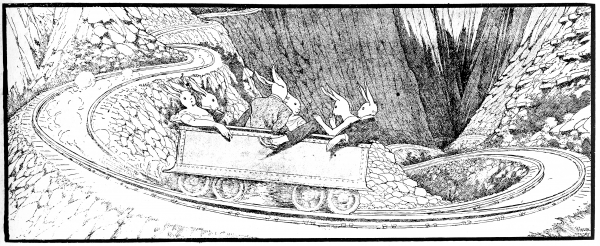
A video of this post (play it with close captions on):
Leave a Reply